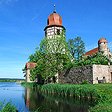FIELD MARSHAL JOSIAS SAXE-COBURG STATUE
War and Apple Strudel
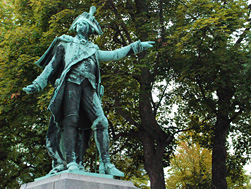 As I write this, there is much discussion and consternation in the US about monument statues to long gone military men and their meaning and history. America in general is not really all that big on public statues of generals, (see Patton ), tending more to monument plaques at places where the slept. and other symbolic markers. In Europe, where generals tended to be of noble houses, princes and counts of one sort or another, statues in town squares are more common, in assorted poses and often astride horses. In the central a square of Coburg Germany is a monumental figure of Prince Albert of Saxe-Coburg, who married Queen Victoria and fathered the current line of English monarchy.
As I write this, there is much discussion and consternation in the US about monument statues to long gone military men and their meaning and history. America in general is not really all that big on public statues of generals, (see Patton ), tending more to monument plaques at places where the slept. and other symbolic markers. In Europe, where generals tended to be of noble houses, princes and counts of one sort or another, statues in town squares are more common, in assorted poses and often astride horses. In the central a square of Coburg Germany is a monumental figure of Prince Albert of Saxe-Coburg, who married Queen Victoria and fathered the current line of English monarchy.
A few blocks away near the Ehrenberg Palace, watching over the busy comings and goings of city busses, is a less familiar figure, but one of the more interesting of statuary poses, in military dress, in green patina colored bronze, with a laconic outstretched pointing finger, as if suggesting, rather than commanding, a march to some far off battlefield. And in a curious reference, a city guide, tells that this fellow is the man who brought the dessert of Apple Strudel (Apfelstrudle) to Germany.
Apple Strudel, really!
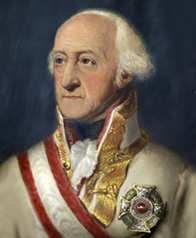 Prince Frederick Josias of Saxe-Coburg-Saalfeld was born at the Ehrenburg Palace in Coburg in 1737, the youngest son of Duke Francis Josias of Saxe-Coburg-Saalfeld and Anna Sophie, Princess of Schwarzburg-Rudolstadt (see Freidrich Schiller House Weimar). He was the great-uncle of King Leopold I of Belgium and great-great-uncle of Queen Victoria. He joined the military during the Seven Years War of Succession as a colonel in 1759 and rose to the rank of Lt. Field Marshal. In the Russian-Turkish-Austrian war of 1788 he commanded a corps of the Hapsburg army occupying Moldavia, and defeated the Ottoman Army of the Grand Vizer Yusef Pasha at the Battle of Rymnik, capturing Bucharest and facilitating the joining of Hungary to the Austro-Hungarian Empire.
Prince Frederick Josias of Saxe-Coburg-Saalfeld was born at the Ehrenburg Palace in Coburg in 1737, the youngest son of Duke Francis Josias of Saxe-Coburg-Saalfeld and Anna Sophie, Princess of Schwarzburg-Rudolstadt (see Freidrich Schiller House Weimar). He was the great-uncle of King Leopold I of Belgium and great-great-uncle of Queen Victoria. He joined the military during the Seven Years War of Succession as a colonel in 1759 and rose to the rank of Lt. Field Marshal. In the Russian-Turkish-Austrian war of 1788 he commanded a corps of the Hapsburg army occupying Moldavia, and defeated the Ottoman Army of the Grand Vizer Yusef Pasha at the Battle of Rymnik, capturing Bucharest and facilitating the joining of Hungary to the Austro-Hungarian Empire.
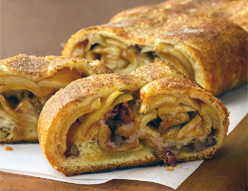 Field Marshal Frederick Josias brought two things back home with him to Saxon Germany and the Hapsburg Empire from the east. He had a fathered a love child with a local commoner in Moldavia, Therese Stroffeck, whom he brought to Coburg with him to marry - and he brought a passion for the sweet dessert he enjoyed in the eastern service, a variation of the Turkish Baklava, a filo dough pastry, which in Hungary by the late 17th Century had been transformed into a layered pastry with fruit, especially apples, then rolled into a “strudel” in German meaning “whirlpool” for its shape of layers when cut. The dessert’s popularity would spread with the growth of Austrian café society (see Cafes of Vienna), and throughout the reaches of the German language countries, especially the Hapsburg influenced Austria and Bavaria.
Field Marshal Frederick Josias brought two things back home with him to Saxon Germany and the Hapsburg Empire from the east. He had a fathered a love child with a local commoner in Moldavia, Therese Stroffeck, whom he brought to Coburg with him to marry - and he brought a passion for the sweet dessert he enjoyed in the eastern service, a variation of the Turkish Baklava, a filo dough pastry, which in Hungary by the late 17th Century had been transformed into a layered pastry with fruit, especially apples, then rolled into a “strudel” in German meaning “whirlpool” for its shape of layers when cut. The dessert’s popularity would spread with the growth of Austrian café society (see Cafes of Vienna), and throughout the reaches of the German language countries, especially the Hapsburg influenced Austria and Bavaria.
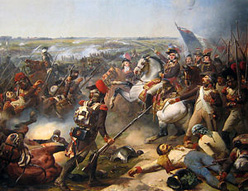 Prince Josias went on to command the Austrian-Netherlands army during the Campaign of Flanders against the French Revolutionary forces in the War of the First Coalition, with a victory at Neerwinden in 1793. He fought into France, taking Valenciennes (see Valenciennes Cathedral) but ran into a setback defeat against French general Jean Baptiste Jourdan along the Sambra River at the Battle of Fleurus near Charleroi in 1794. The field marshal would draw his forces back to Waterloo, where the more famous battle defeat of Napoleon would take place about 20 years later. The Fleurus battle was costly in men for the French, but their success caused the Austrian coalition allies to withdraw back across the Rhine, allowing the French to push into the Rhineland and the collapse of the Dutch republic in Flanders (see Rhine Castle Frankenstein).
Prince Josias went on to command the Austrian-Netherlands army during the Campaign of Flanders against the French Revolutionary forces in the War of the First Coalition, with a victory at Neerwinden in 1793. He fought into France, taking Valenciennes (see Valenciennes Cathedral) but ran into a setback defeat against French general Jean Baptiste Jourdan along the Sambra River at the Battle of Fleurus near Charleroi in 1794. The field marshal would draw his forces back to Waterloo, where the more famous battle defeat of Napoleon would take place about 20 years later. The Fleurus battle was costly in men for the French, but their success caused the Austrian coalition allies to withdraw back across the Rhine, allowing the French to push into the Rhineland and the collapse of the Dutch republic in Flanders (see Rhine Castle Frankenstein).
Best
vacation deals compare prices in Bavaria
at TripAdvisor
These articles are copyrighted and the sole property of Bargain Travel Europe and WLPV, LLC. and may not be copied or reprinted without permission.
See Also:
CALLENBERG CASTLE - PRINCE ALBERT & VICTORIA
MOZARTHAUS LEOPOLD BIRTHHOUSE - AUGSBURG
FUGGER & WELSER MUSEUM - AUGSBURG
WILHELMSBURG CASTLE - SCHMALKALDEN

